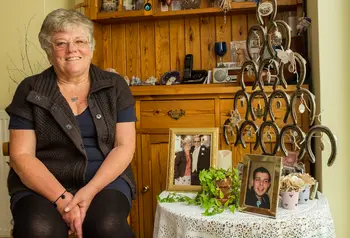Changing lives: Linda pays tribute to great-grandfather

Linda Wood describes herself as an amateur family historian who had been piecing together the history of her relative Sidney Stratford. Beginning with a small black and white image of a gravestone passed down from her great grandmother, Linda, 63, had started her detective work.
Discovering Sidney's story
Close examination of the photograph revealed her great grandfather’s name on the gravestone beneath a Royal Navy crest. Thanks to the Commonwealth War Graves Commission she was able to locate the headstone to Grimsby Cemetery. A visit revealed that Sidney Stratford had died, along with several other men, when the trawler Alberta - pressed into minesweeping service by the Navy - was sunk by a mine in the North Sea in April 1916.
“Further investigation on the internet gave me more details including where the ship had been lost. So now I had an end to the story. Or so I thought.” says Linda.
Finding the shipwreck
Then, out of the blue, came more information. “One evening, back in 2015, I was visiting mum and she had the TV on watching the BBC regional news – Look North – and while we were chatting I just heard the name ‘Alberta’ which caught my attention,” she says.
The TV programme was reporting the project Shipwrecks of the Humber – Grimsby’s Lost Ships of WW1, which was made possible by money raised by National Lottery players. A team of divers, searching for the wrecks of up to 30 lost vessels, had discovered the site where the ‘Alberta’ had gone down.
Once-in-a-lifetime opportunity
There and then Linda decided to make contact with the project organisers. She discovered that her great grandfather, who had been a Royal Navy petty officer, had been put in command of the ‘Alberta’ and its crew of six. All perished when it hit a mine and a second trawler that went to her aid was also sunk. Other vessels recovered the bodies and brought them home to Grimsby.
Then Linda received a surprise invitation from the project team. “They gave me the once-in-a-lifetime opportunity to sail with them out to the wreck site, to honour my great grandfather's memory as well as his crewmen by scattering flowers on the water above her location,” she explains. The trip was also to include the placing of a plaque on the actual wreck as a lasting memorial.
Rollercoaster of emotions
“The whole experience has given me something of a rollercoaster of emotions from excitement and happiness, to sadness and poignancy,” says Linda. “It made me smile and shed a tear. It has given me considerable knowledge and insight from reading Admiralty reports into what happened to not just my ancestor but to others lost on board ships from the River Humber.”
Linda, who was born and brought up in Grimsby, is delighted that the project not only answered questions about her own relative, but is also providing information about the lives, and courage, of other local men during the First World War.
She says: “The Heritage Lottery funding of the project has allowed this to happen for me. I genuinely hope that descendants of crews of other ships that the project team have found will be able to experience some of the same emotions that I have been able to.”






